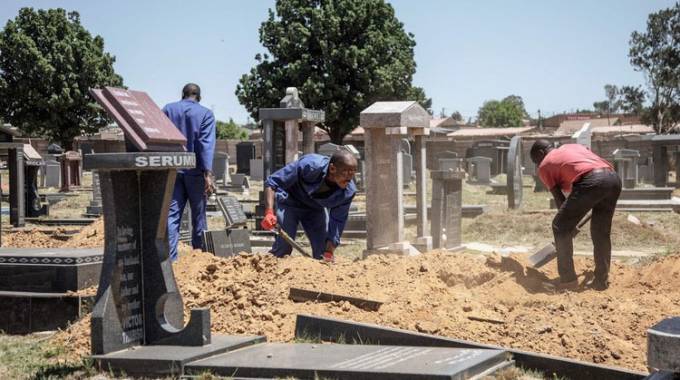With little income to spare, many Zimbabweans are facing tough choices — to insure their health or pay for their own funerals in advance?

A lot of citizens do not have any type of insurance but most of those who are insured prefer to cover expenses for their funeral rather than for medical costs that might otherwise keep them alive.
A growing desire for a decent burial among the poor in Zimbabwe is changing the landscape as far as insurance goes. In a country where funerals are often expensive as they take several days, many people feel it is important to pay for them in advance.
A recent survey by Finmark Trust published by the Zimbabwe National Statistics Agency shows that 30 percent of adult Zimbabweans have some form of insurance. Of those insured people, 77 percent have funeral insurance.
Estimates by the Association of Healthcare Funders of Zimbabwe show that the situation in health insurance is dire.
A 2017 report noted that 1,3 million people — out of more than 14 million people in Zimbabwe have medical insurance, translating to nine percent of the total population.
Chairperson of the Parliamentary Portfolio Committee on Health and Child Care Dr Ruth Labode late last year said she was worried over the obtaining trend where the uptake of funeral policies was more compared to health insurance.
“Why is it that Zimbabweans find it attractive to pay funeral policy than to pay for their health insurance? Is it important to be buried nicely? Because if you ask, almost every Zimbabwean is paying some kind of funeral policy,” said Dr Labode.
But why are people not securing their health, something that would delay death?
Mr Aaron Nduriya, an informal trader, said death is more important to him than life. He feels that there is not much motivation to pay for medical aid, a service that he might fail to access when he needs it.
“Some doctors no longer accept medical aid because they don’t get paid by insurance companies,” he said, adding that given a choice, a funeral policy is better because death is untimely and certain.
During the hyperinflationary period, life insurance policies were wiped out, along with the life savings of milions of people.
Most insurance companies offer policies that cover funerals, but often it is funeral homes themselves that act as informal insurers, according to research published in 2011 by the Micro-Insurance Innovation Facility, a division of the International Labour Organisation.
Experts admit that demand for funeral insurance is particularly strong among poorer Africans because of the traditional importance attached to the ritual and an increasing desire for a “decent burial”, even among households in financial difficulties.
Many Zimbabweans choose funeral insurance over medical insurance to guarantee that they will be able to afford gravestones, funeral services and other details that are expected on the last day.
Medical insurance, often called medical aid in Zimbabwe, costs anywhere from $300 to $500 or more per month, depending on the plans and the services provided by any insurance company.
Funeral insurance, on the other hand, cost as little as $50 per month for a basic plan.
Could this be the reason many are opting for it?
Dr Rupiya Madzika, a general practitioner, claimed that doctors are “forced” to pay taxes to the Zimbabwe Revenue Authority before they receive money from the patients on medical aid cover.
“We are no longer accepting medical aid. We need money upfront, it is not that we don’t value human life but we are not being paid by the insurance companies after treating their clients,” he revealed.
Most of the insurance industry’s big money-spinners like motor insurance and cover for household goods are irrelevant to the majority of Zimbabweans who cannot afford a range of expensive personal possessions.
But high death rates and low savings levels mean funeral insurance is proving an easier sell among people daunted by the cost of ceremonies that can stretch to several months of income.
Zimbabweans are by no means alone in spending heavily on honouring their dead — funerals in Africa follow the same trend.
High unemployment and above-average birth rates across much of Africa also mean that employees can have many dependants, making it more likely they will seek funeral insurance. The Sunday Mail






